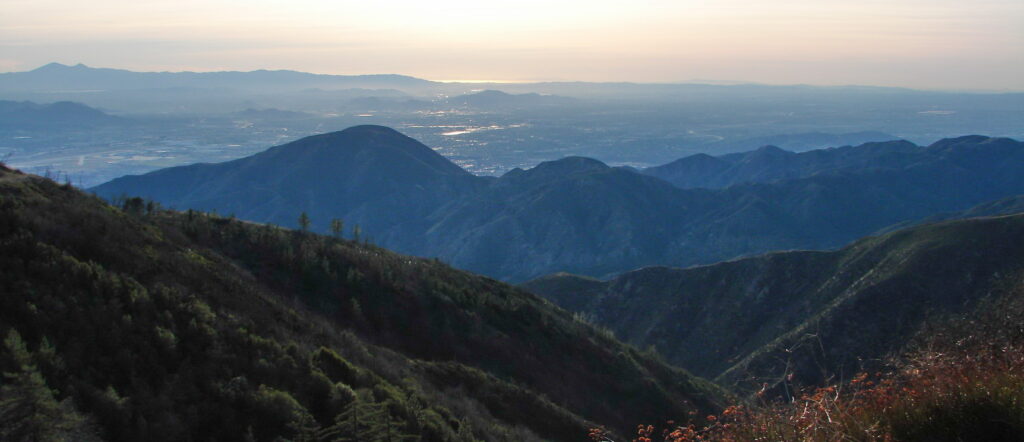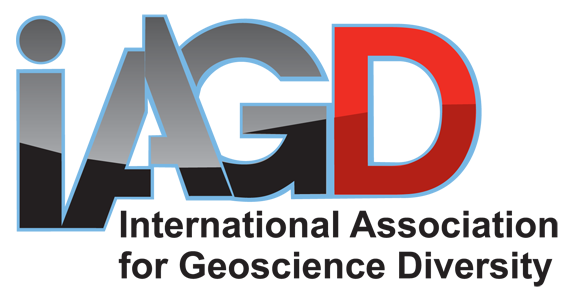
View of San Bernardino Valley from Cajon Pass.
When & Where:
When: After GSA Connects, Thursday, Sept 26, 8:00 a.m – 6:30 pm PST
Where: Anaheim, CA. Departing and returning to Anaheim Convention Center.
Field Trip Description
NOTE: Sadly, the Palm Springs Tramway will be closed for maintenance on our field trip date and we have had to change the itinerary. Looking forward to exploring the San Andreas with everyone in this new itinerary!
Explore the landscapes and hazards created by the San Andreas fault system with the IAGD while learning about field accessibility and inclusive science communication. Explore tectonic terrain of Cajon Pass, with fluvial terraces offset by the fault and a sag pond (Lost Swamp). A lunch and learn stop at Eaton Falls Nature Center, at the base of the San Gabriel Mountains along the Sierra Madre fault, provides exhibits about the regional geology and nature trails to explore. Then travel to the famous Griffith Observatory in L.A. to for fabulous overviews and discussion of the tectonic setting and urban hazards of the Los Angeles Basin.
This trip is sponsored by the International Association for Geoscience Diversity (theIAGD.org), and is offered at no cost to participants. Transportation during the field trip, entrance fees and lunch are all covered thanks to our donors. Some locations have paved sidewalks, others have gravel and dirt paths, but all are wheelchair accessible. We are excited to offer communication in English, Spanish and American Sign Language (ASL). Other accommodations can be provided upon request. In order to ensure that priority is given to geoscience colleagues with disabilities or other needs that would prevent their participation in other trips, an application form is required. Participants will be notified one month in advance of the conference. Transportation during the field trip, entrance fees and lunch are all covered thanks to IAGD donors. Everyone is welcome!
Itinerary
8:00 am – Depart Anaheim convention center
Stop 1: 9:15 -9:45 Glen Helen Regional Park
Discuss views of foothill area and nearby tectonic features.
- Access notes: paved. Accessible restrooms available (the primary reason for the stop)
Stop 2: 9:30 -11:30: Lost Lake Day Use Area
Demonstrate inclusive techniques for field learning to explore faulting features in the area.
- Access notes: unpaved – gravel or hardpacked dirt trails. Can engage with landscape and activities near the bus, or with a walk. We will fly a drone here, weather permitting.
Stop 3: 12:30 -2:00: Eaton Falls Nature Center
Lunch. Explore the geology exhibits and large tactile map. Tie in what we’ve seen so far to the regional geology. Free explore the nature trails (time permitting).
- Access Notes: Paved trails, accessible restrooms, air conditioning indoors.
Stop 4: 2:45 -5:00 pm: Griffith Observatory
2:45-3:15 pm personal time (Bathrooms, gift shop, snacks etc.)
Discussion of city vista, the underlying geology, and how it relates to what we’ve seen the rest of the day. This site will emphasize the urban risk/hazards of earthquakes.
- Access notes: Tourist attraction with all the amenities (restrooms, gift shop, cafe, etc.)
Return to Convention center between 6:00 – 6:15pm (traffic willing)
Want to get an idea of what IAGD field trips are like? Check out our previous IAGD Field Trips.
Field Trip Leaders
Anita Marshall (she/her) is a Lecturer and geoscience education researcher at the University of Florida, the Executive Director of the International Association for Geoscience Diversity (IAGD), a member of the Choctaw Nation of Oklahoma, and a Disabled geoscientists with a physical disability. Anita specializes in inclusive, accessible experiential learning and leads field trips designed for people with disabilities and other underserved identities in STEM ranging from day trips to a full multi-week field camp.
Michele Cooke (she/her) is a Professor of fault mechanics at the University of Massachusetts Amherst. Michele has been researching active faulting in southern California for 20+ years and has experience both leading field trips in the region and leading accessible trips. She uses both ASL and English languages.
Kate Scharer (she/re) is a Research Geologist with the Earthquake Science Center of the US Geological Survey in Pasadena. Kate studies active faults in Southern California, notably the San Andreas and Sierra Madre fault systems. Her recent work uses fire histories and radiocarbon dating to better constrain dates of past ground rupturing earthquakes.
Brian Castillo (he/him) served as an adjunct professor at CSUSB for 5 years before transitioning to a career in the industry. During his tenure, Bryan actively participated in research on various paleoseismic sites along the southern section of the San Andreas fault. Although he has shifted his focus to industry, Bryan remains passionate about educating others on seismic hazards, particularly in California. He continues to maintain an online presence through social media, where he engages in the dissemination of geoscience information and earthquake hazard communication. Bryan is also engaged in communicating geosciences in Spanish.
How to Participate:
Our trips prioritize two types of participants: 1. geoscience colleagues with disabilities or other needs that would limit their participation or enjoyment in other field trips, and 2. instructors who are interested in guidance and ideas on how to run inclusive accessible field trips. To make sure those groups are adequately represented, an application form is required. Other applicants who are looking for a fun geo trip with great people will be given any remaining spots. Participants will be notified at least one month in advance of the conference. Apply at: https://shorturl.at/rsxJ0


